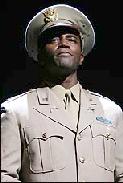SEARCH
REVIEWS
FEATURES
NEWS
Etcetera and
Short Term Listings
LISTINGS
Broadway
Off-Broadway
BOOKS and CDs
OTHER PLACES
Berkshires
London
LA/San Diego
Philadelphia
Elsewhere
QUOTES
On TKTS
LETTERS TO EDITOR
FILM
LINKS
MISCELLANEOUS
Free Updates
Masthead
Writing for us
A CurtainUp Review
A Soldier's Play

Taye Diggs
(Photo: Joan Marcus) |
It is almost impossible not to be mesmerized by the hammer and tongs investigation into the murder of a despised African-American Army officer. The inquiry by another African-American lawyer sent to the scene of the crime becomes a scorching and purging take on the seeds of racism, bigotry, and social injustice as it affects a black regiment stationed at Fort Neal, Louisiana in 1944. Given the issues of social inequality and apathy that have ironically surfaced in the light of the present post Katrina fiasco/debacle, the play resonates with even more chilling and sobering truths. Perhaps this is why it seems like a new play.
From the opening gunshots that end the life of Tech/Sergeant Vernon C.Waters (James McDaniel), a mean-spirited disciplinarian ashamed of his background and his race, and throughout the informal hearings that bring witness after witness -- both black and white, i n flashbacks and the present -- the drama builds its case. It is, however, less about trapping the perpetrator than it is about exposing the malevolent forces and abrasive personalities surrounding the act itself.
As the swift concise scenes follow one another the evidence of the sergeant’s pathology seems less clear. The investigating Capt. Davenport (Taye Diggs) uncovers, at first incidentally and then more aggressively, the seemingly contradictory personality of the victim through the careful and agonizing interrogation of the suspects.
One by one the enlisted men respond and gradually reveal the deepening complexity of the investigation: the high-strung, talkative Private James Wilkie (Michael Genet); the gullible, guitar-strumming farm boy private C.J. Memphis (Mike Colter); the antagonistic unflinching Private First Class Melvin Peterson (Anthony Mackie); two uncompromisingly bigoted white officers Lieutenant Byrd (Joaquin Perez-Campbell), and Captain Wilcox (Joe Forbrich); Peterson’s squirming sidekick Private Tony Smalls (Teagle F. Bougere) . All have ample motives, and with raw edged barrack style realism, all become spokesmen for playwright Fuller’s provocative inquiries into more crimes than initially meet the eye.
The excellent performances of Messrs. McDaniel and Diggs, paradoxically opposing types, are key elements to the success of this revival. There is a sense of emotional restraint in Diggs’ performance that occasionally suggests Captain Davenport to be more of a symbol than a part of the incendiary elements in action around him. However, Digg’s calculated and muted performance remains a dominant force. McDaniel’s volatile, highly charged performance leaves little doubt about Water’s conflicted personality. And his presence, even when he is not onstage, is palpable.
There are virtually no supporting roles only virtuoso performances. Mackie, who made such excellent impressions in recent seasons in less than impressive plays as McReele and Drowning Crow, brings a stunningly incendiary dynamic to the rebellious and recklessly insubordinate Peterson (the role that Denzel Washington originated) . Being large and muscular doesn’t detract from Colter’s poignant performance as the unsophisticated ill-fated C.J. Memphis. Pasquale invests the arrogant commanding officer Captain Charles Taylor with just enough condescension. His scenes with the persistent Davenport boil with tension. Taylor is convinced that the murder was committed by two white officers while the African-American soldiers believe it was an act of the Klan. Another standout performances is registered by Genet as the outwardly jovial "brown nose" Wilkie who may be harboring some deep seated anger ever since Waters took away his stripes for being drunk on guard duty. As the white officers, Perez-Campbell and Forbrich are appropriately scary and offensive.
Under Jo Bonney’s taut yet fluid direction, the actors share a common discipline that leads directly to the core of each of their characters without stealing the thunder from each other. Within the confines of Neil Patel’s simple oval-shaped barracks (effectively lighted by David Zinn), the strong ensemble reflects the truth and nothing but the truth. Bonney, who has a real flair for tough drama maintains a firm grip on the tense, one-on-one scenes even as she encourages the actors toward some wonderfully unaffected freedom and an honest naturalism in the lighter moments.
This hand-grenade of a play explode with contemporary force despite being set in 1944. This is one revival that would do Broadway proud.
Editor's Note: Readers might be interested in checking up a brief 1996 Off-Broadway revival of the play at the same theater where it premiered --A Soldier's Play--Valiant Theatre Company
|
A SOLDIER'S PLAY Playwright Charles Fuller Directed by Jo Bonney. Cast: Teagle F. Bougere (Private Tony Smalls), Mike Colter (Private C. J. Memphis), Taye Diggs (Captain Richard Davenport), Nelsan Ellis (Corporal Bernard Cobb), Joe Forbrich (Captain Wilcox), Michael Genet (Private James Wilkie), Royce Johnson (Corporal Ellis), Anthony Mackie (Private First Class Melvin Peterson), James McDaniel (Tech/Sergeant Vernon C. Waters), Dorian Missick (Private Louis Henson), Steven Pasquale (Captain Charles Taylor) and Joaquín Pérez-Campbell (Lieutenant Byrd). Set Design: Neil Patel Costume Design: David Zinn; Lighting Design: David Weiner Sound Design: Fitz Patton Running time: 1 hour and 50 minutes, includes an intermission Second Stage, 307 West 43rd Street, 212-246-4422 From 9/20/05 to 11/27/05; opening 10/17/05. Tickets: $65 Reviewed by Simon Saltzman based on October 20th performance |

Easy-on-the budget super gift for yourself and your musical loving friends. Tons of gorgeous pictures.

>6, 500 Comparative Phrases including 800 Shakespearean Metaphors by our editor.
Click image to buy.
Go here for details and larger image.








